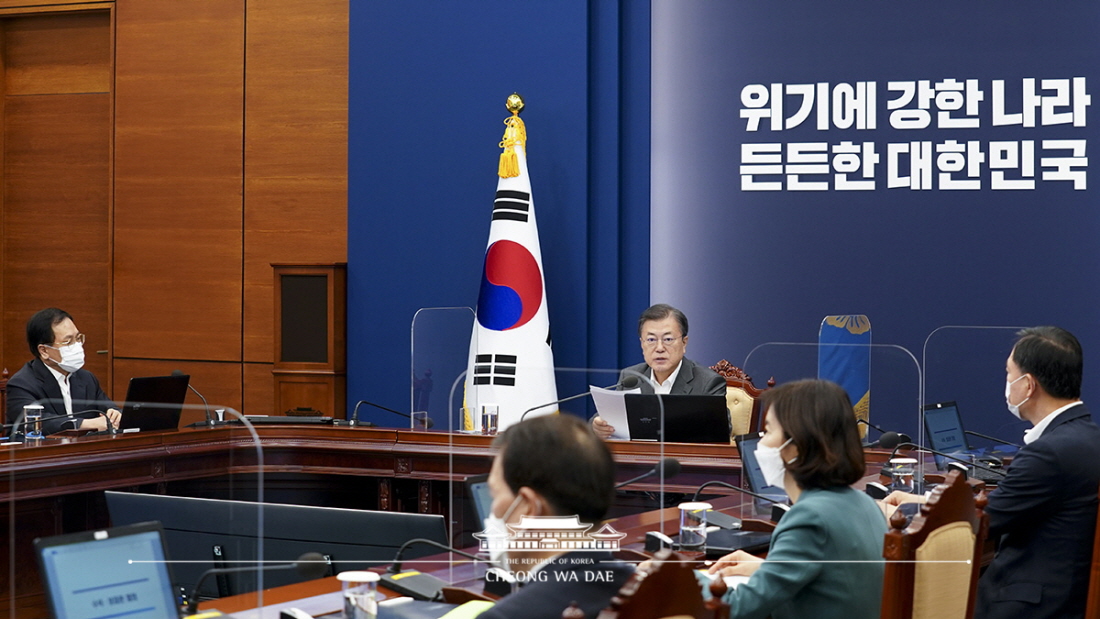이 웹사이트는 제19대 대통령 임기 종료에 따라 대통령기록관이 「대통령기록물 관리에 관한 법률」에 의해 이관받아 서비스하는 대통령기록물입니다. 자료의 열람만 가능하며 수정 · 추가 · 삭제는 불가능합니다.
다만, 「개인정보보호법」에 의하여 개인의 정보를 보호받기 원하시는 분은 관련 내용(요청자, 요청내용, 연락처, 글위치)을 대통령 웹기록물 담당자(044-211-2253)에게 요청해 주시면 신속히 검토하여 조치해 드리겠습니다. 감사합니다.
SPEECHES & REMARKS
BRIEFINGS
Opening Remarks by President Moon Jae-in at Meeting with His Senior Secretaries

Two outside participants are joining us today to discuss an item on the agenda: Superintendent Cho Hee-yeon of the Seoul Metropolitan Office of Education and Seoul Bongeun Elementary School Principal Han Sang-yun. Thank you for coming. Let’s welcome them with a round of applause.
At last, COVID-19 vaccinations will commence this week. We will ensure that vaccines will be administered to those prioritized – the staff and residents at nursing hospitals and facilities – in a swift, safe and systematic manner. There must not be the slightest bit of negligence in epidemic prevention and control even after inoculation starts. Every time the number of confirmed cases spikes, the hearts of the self-employed sink. We should prevent a situation where social distancing levels have to be raised yet again. I urge everyone to maintain vigilance and pull together when complying with anti-epidemic guidelines. The Government, for its part, will do everything in its power to stem the spread of the virus, including by intensively taking stock of those types of establishments and facilities that have recently been hit by clusters of COVID-19 infections. As in-person classes are scheduled to begin next week at elementary, middle and high schools, I ask everyone to stay fully alert and prepare thoroughly to maintain epidemic prevention and control.
Statistics Korea’s Household Income and Expenditure Survey for the fourth quarter of last year attested to the fact that the COVID-19 situation weighed heavily on household incomes. In particular, the earned incomes of the first and second quintiles – those in the lower 40 percent of income levels – showed a marked decrease. Business profits of microbusiness owners and the self-employed also dwindled due to a contraction of economic activities and the implementation of enhanced anti-epidemic measures. Despite these adverse conditions, overall household income actually rose among all quintiles because transfer payments increased thanks to the Government’s active fiscal policy.
Government spending is credited for 40% of the improvement in income distribution, showing that fiscal policy has contributed greatly to minimizing the deepening of inequality. The Government will further strengthen the active role of fiscal spending. This year, we will make all-out efforts to achieve two overriding goals: reducing income inequality and expediting economic recovery.
We will work to ensure that distribution of the fourth round of emergency relief payments will be as broad and large as possible while minimizing blind spots to support those who have suffered damage, protect the vulnerable who have low incomes and overcome the employment crisis, among others. The Government must accelerate drawing up a supplementary budget proposal and seek cooperation from the National Assembly so that distribution of the funds can preferably commence in March. Economic recovery and a leap forward can be reinforced when backed by inclusive underpinnings. While working hard to protect people’s lives amid this crisis, we will have to redouble our efforts to enhance our economy’s dynamism and usher in a new future. The main players in our economy’s dynamic nature are by far business ventures and startups.
Despite the difficult situation due to COVID-19, we are continually seeing business ventures that seek innovation and take on new challenges. Last year again, the number of newly founded corporations and technology-driven startups increased, with both venture-related funds raised and investments made recording all-time highs. Since the launch of my Administration, the number of unicorns – unlisted companies valued at one trillion won or more – increased by 10 to stand at 13 now, and the number of soon-to-be business unicorns is increasing at a surprising rate. Business ventures are precisely what have served as the driving force behind stock market growth, ushering in the era of KOSPI exceeding the 3,000-point mark.
In particular, the main pillar of employment is shifting toward business ventures. Despite the serious deterioration in employment due to the COVID-19 pandemic last year, business ventures actually created over 50,000 new jobs. The total number of employees at business ventures stood at 720,000, exceeding the figure at the four largest conglomerates combined. In terms of job quality, business ventures are also playing the role of creating decent jobs in new industries such as ICT, biohealth and medical services. Business ventures represent the future of the Korean economy and a new repository of jobs.
The Government will intensively foster business ventures and startups as the main players in our pace-setting economy while pursuing the Korean New Deal and 2050 carbon neutrality as national strategies. We will ensure that business ventures and startups will play a central role in an economic leap forward by actively promoting business venture powerhouse projects such as the “K-Unicorn Project.” At the same time, the third generation of innovative companies based on non-face-to-face digital technology will be cultivated.
Meanwhile, a recent series of donations announced by those who had launched business ventures has given our society a refreshing surprise. It is very meaningful that business venture entrepreneurs, who epitomize innovation and a pioneering spirit, are creating a new donation culture. I join the people in giving them a big round of applause for their pledge to generously return their self-made wealth to society. Along with the donation culture of these innovative founders, another positive change is the spread of corporate social responsibility in management. This will serve as an opportunity for businesspeople to simultaneously gain respect and increase corporate value. I hope that these acts by the founders of new businesses and entrepreneurs will become the foundation for moving our society toward a more inclusive and dignified one, as seen in the case of the social solidarity fund.
Thank you.



